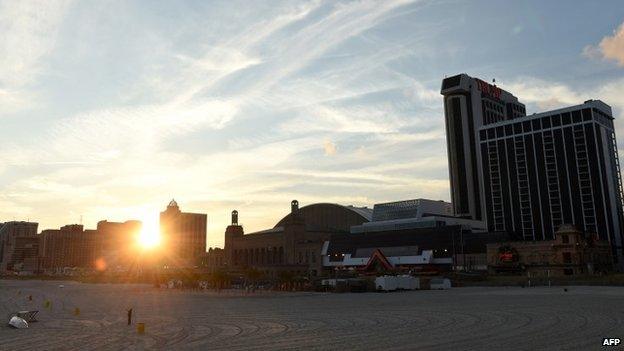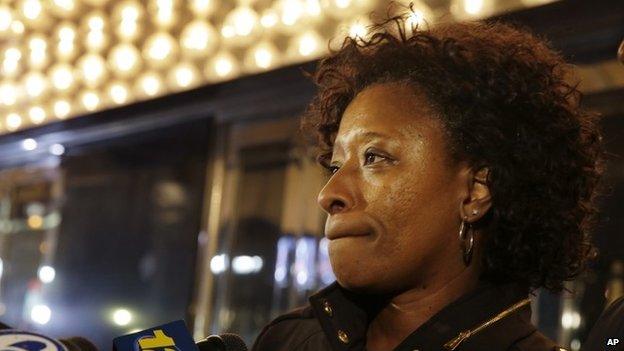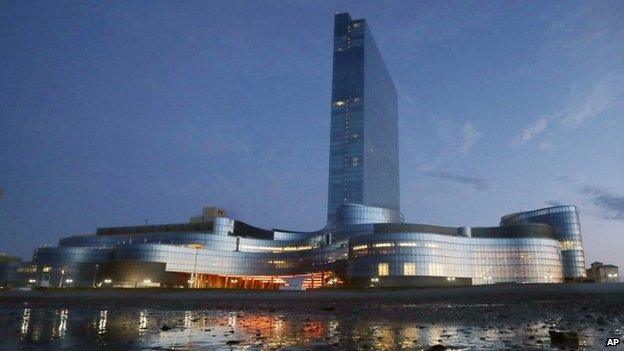Atlantic City: Decline in the US gambling centre
- Published
Atlantic City down on its luck
Atlantic City used to call itself America's playground. The problem is that not so many Americans are coming here to play.
Along stretches of the city's famed boardwalk, blank screens and funereal black has replaced the dancing neon and garish signage of some of its most famous gaming palaces.
A third of the casinos are now shrouded in darkness. Small wonder. Over the past eight years, casino revenues in Atlantic City have plummeted by nearly 50%
Trump Plaza, one of the city's marquee names, is the latest to shut down. At 06:00 on Tuesday, CLOSED signs were posted on its doors. Last week Trump Entertainment Resorts filed for bankruptcy.
Another of its properties, the Trump Taj Mahal, a gauche recreation of the Indian mausoleum, also faces the threat of closure, unless a cost-cutting deal can be reached with the unions.
Ruth Hardrick, who worked as a card dealer at the Trump Plaza for 26 years, was among the thousand workers laid off.

The Trump Plaza (right) is the fourth Atlantic City casino to close this year
"Twenty-six good years," she said as she completed her last overnight shift and walked home along the empty boardwalk.
"Last couple of years were a little nerve-wracking, but I stayed because I was happy here and it was a good house for a while. I'm sad it had to come to this."
At the other end of the boardwalk, the Showboat casino closed in August after almost 30 years in business.
An even bigger body-blow for Atlantic City came the following day with the closure of the Revel casino next door, which cost $2.4bn (£1.5bn) to construct and supposedly pointed toward a brighter future.
When it opened just two years ago, New Jersey's Governor Chris Christie heralded it as a "game-changer".
In the space of 24 hours, the city had lost 5,000 jobs.
Atlantic City casinos used to enjoy a monopoly not just on America's north-eastern seaboard, the most densely populated part of the country, but on the eastern side of the Mississippi River.
Now that neighbouring states like New York, Pennsylvania and Maryland have relaxed their gambling laws, the market is saturated.
There are too many casinos and not enough gamblers. The regional gambling market has grown by less than 1% since 2001. Over the same period, 14 rival casinos have opened up in nearby states.
In an industry already reeling from the Great Recession, it has been hard to persuade out-of-state gamblers to drive past casinos closer to home, and to beat a path to Atlantic City.
For Donald Trump, who 30 years saw Atlantic City as a rival for Las Vegas, it has been galling to watch.
Recently, he's distanced himself from the casinos that bear his name. The property tycoon owns just 10% of Trump Entertainment Resorts, and has taken legal action to have his name removed from the properties.

Ruth Hardrick leaves after her final overnight shift at the Trump Plaza
He complained it was damaging his personal and corporate brand.
"A lot of it has to do with poor political management and a lot of has to, frankly, with too much competition," he told me, in the boardroom of Trump Tower, his headquarters on Fifth Avenue in New York.
"Casinos are opening all over the East Coast, and in the end they are just going to cannibalise and kill themselves.
"It's sad for Atlantic City. I know so many people there still to this day, and they're wonderful people, and now they don't have jobs, so it's a very sad thing."
On Tuesday, via his Twitter account, external, he said that he might buy back into Atlantic City at a much lower price to save the Trump Plaza and Trump Taj Mahal.
"Does anyone notice that Atlantic City lost its magic after I left years ago?" he added, with typical braggadocio.
But to say that Atlantic City is dying would be to compose a premature obituary. The good times continue to roll at upmarket casinos like The Borgota, which has just enjoyed its busiest August since 2009.
The key is to make casinos in Atlantic City destination resorts, by offering top quality restaurants, platinum service and crowd-pulling shows.

The Revel closed in early September after only two years in operation
Tom Balance, the chief operating officer and president of Borgata Hotel, Casino and Spa, says top-flight casinos need to differentiate themselves from convenience casinos, which attract customers who live nearby and whose main purpose is to play slot machines.
"Even the most pessimistic forecasts have Atlantic City at a $2bn market, which would still be the third biggest market in the US five years from now," says Mr Balance, gazing out over his modern-looking gaming hall.
"It's not dying, it's just changing dramatically."
If not facing death, much of Atlantic City is unquestionably in sharp decline. "How you doin' AC?" asks the city's supposedly upbeat marketing campaign.
Not well is the undeniable answer.
- Published23 May 2011